INDIA AND Israel have an extensive economic, military, and strategic relationship. Relations between the two countries have widened remarkably since India recognised Israel diplomatically in 1950.
Benjamin Netanyahu’s visit to New Delhi in January 2018 marked 25 years of India establishing diplomatic ties with Israel. It came six months after Prime Minister Modi visited Israel, the first ever by an Indian Prime Minister, bringing ties out of the closet.
Netanyahu is only the second Israeli Prime Minister to visit India—the first such visit took place in 2003 when Ariel Sharon was in New Delhi at the invitation of then Prime Minister Atal Bihari Vajpayee.
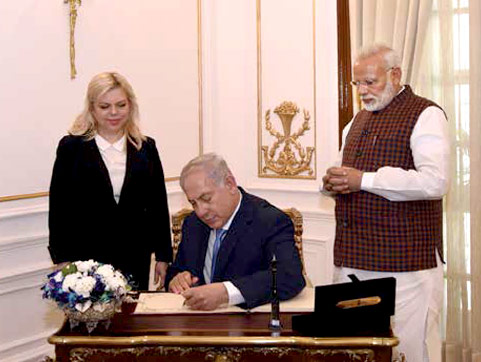
A Brief History
Once seen as a strong backer of Palestine, New Delhi announced the opening of diplomatic ties with Israel in January 1992 after Israeli and Palestinian delegations began peace talks that culminated in the Oslo accord between the two in 1993. India-Israel ties have soared since then with defence, agriculture, water conservation, technology and innovation being the focus areas for cooperation. But there was little open acknowledgement of the depth of the relationship in a bid to balance ties with India’s partners in the Arab world.
Following India’s recognition of Israel on September 17, 1950, Indian Prime Minister Jawaharlal Nehru had stated: “India would have recognised Israel long ago, because Israel is a fact. We refrained because of our desire not to offend the sentiments of our friends in the Arab countries.” In 1953, Israel was permitted to open a consulate in Bombay (now Mumbai). However, the Nehru government did not want to pursue full diplomatic relations with Israel as it supported the Palestinian cause, and believed that permitting Israel to open an embassy in New Delhi would damage relations with the Arab world.
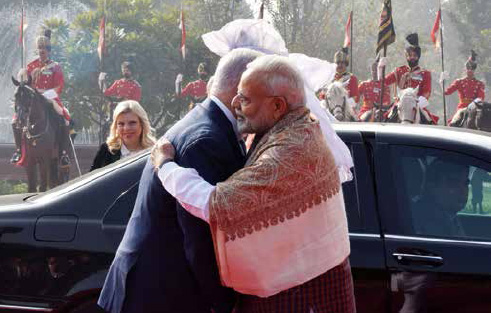
The relationship between the two countries remained mainly informal in nature till the early 1990s. India’s opposition to official diplomatic relations with Israel stemmed from both domestic and foreign considerations. Domestically, politicians in India feared losing the Muslim vote if relations were normalised with Israel.
Also, India did not want to risk the large amount of its citizens working in Arab States, who were helping India maintain its foreign-exchange reserves. India’s domestic need for energy was another reason for the lack of normalisation of ties with Israel, in terms of safeguarding the flow of oil from Arab nations.
Cementing Defence Ties
In January 1992, India formally established relations with Israel when it opened an embassy in Tel Aviv after decades of non-aligned and pro-Arab policy. Ties between the two nations have flourished since, primarily due to common strategic interests and security threats.
Since the Modi government came to power, there has been a flurry of high-level visits. Apart from Modi’s own visit to Israel, then President Pranab Mukherjee in 2015 and Foreign Minister Sushma Swaraj in 2016 also travelled to Israel, signifying an upscaling both in terms of visibility and focus. Netanyahu too acknowledged the role played by Narendra Modi to strengthen the India-Israel partnership. “The diplomatic relations existed for 25 years but something different is happening now because of Modi’s leadership”.
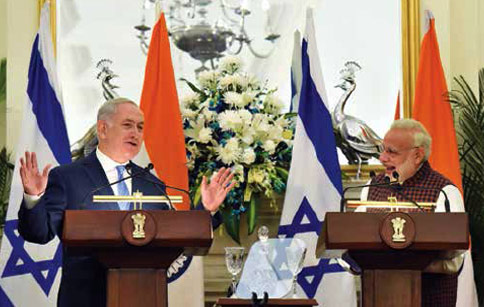
Relations further expanded during Prime Minister Narendra Modi’s administration, with India abstaining from voting against Israel in the United Nations at several occasions during passage of various resolutions.
India and Israel have outlined a blueprint for deepening bilateral relations in the next 25 years during the first visit to India by Israeli Prime Minister Benjamin Netanyahu. The blueprint lays particular emphasis on traditional areas like defence, homeland security and agriculture besides newer areas like oil and gas and cyber security.
In defence, the two ministries are to hold discussions this year with the active involvement of the public and private sectors in order to create the basis for viable, sustainable and long-term cooperation in the defence industry.
Modi also urged Israeli defence firms to take advantage of the “liberalised” Foreign Direct Investment (FDI) regime.
The defence and security cooperation is the most crucial strategic asset for both nations. To identify collaborative ways to deal with the mutual threats requires military and counter-terrorism experts to conduct in-depth deliberations.
India is Israel’s biggest arms market, buying around $1 billion worth of weapons every year. The arms acquisitions
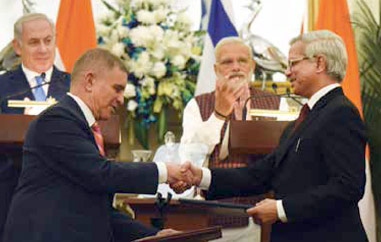
range from Phalcon AWACS (Airborne Warning and Control Systems) and Searcher, Heron and Harop UAVs (Unmanned Aerial Vehicles) to Aerostat and Green Pine radars, Barak anti-missile defence and several types of missiles and laser-guided bombs. Despite the cancellation of the missile deal, India’s defence ministry plans to buy 131 Barak surface-to-air missiles built by Rafael worth $72 million.
India is the largest buyer of Israeli military equipment and Israel is the second-largest defence supplier to India after Russia. The military business between the two nations was worth around $9 billion from 1999 to 2009. Military and strategic ties between the two nations extend to intelligence sharing on terrorist groups and joint military training.
India sent a C-130J ‘Super Hercules’ aircraft in November 2017, along with a 45-member contingent, including Garud commandoes, to Israel to take part in a multilateral ‘Blue Flag-17’ exercise. The exercise was the first instance of an Indian contingent participating in a military exercise in Israel. This was also the first occasion when the air forces of the two nations came together in a multilateral exercise setting.
In February 2014, India and Israel signed three important agreements — Mutual Legal Assistance in Criminal Matters, Cooperation in Homeland and Public Security, and Protection of Classified Material. Under Cooperation in Homeland Security, four working groups in the areas of border management, internal security and public safety, police modernisation and capacity building for combating crime, crime prevention and cybercrime were established.
Israel was one of the main suppliers of weapons to India during the 1999 Kargil War with Pakistan.
Israeli defence players are also actively participating in the “Make in India” initiative and they have formed a number of Joint Ventures (JVs) with Indian partners. The Elbit group of Israel has formed a number of JVs with Indian companies such as Adani-Elbit Advanced Systems India Ltd, a JV to manufacture UAVs in India. Israeli defence companies such as Israel Weapon Industries and Rafael Advanced Systems already have a presence in India.
Israel Aerospace Industries (IAI) signed an MoU with Kalyani Strategic Systems in early 2017 to develop, build and market selected air defence systems and lightweight special purpose munitions. The Israeli defence major has also entered into an agreement with Dynamatic Technologies and Elcom Systems for the production and maintenance work of mini-UAVs in India. IAI’s Golan Industries Division signed an MoU with Taneja Aerospace & Aviation Ltd (TAAL) for the development, production, marketing and sale of civil and military aircraft seats. IAI has also inked a MoU with Premier Explosives Ltd, and IAI and Wipro Infrastructure Engineering (WIN) have announced a strategic alliance to manufacture composite aero structure parts and assemblies.
India’s Tata Power Strategic Engineering Division (Tata Power SED) has aligned with Israel’s DSIT Solutions to supply portable diver detection sonar (PDDS) to the Indian Navy.
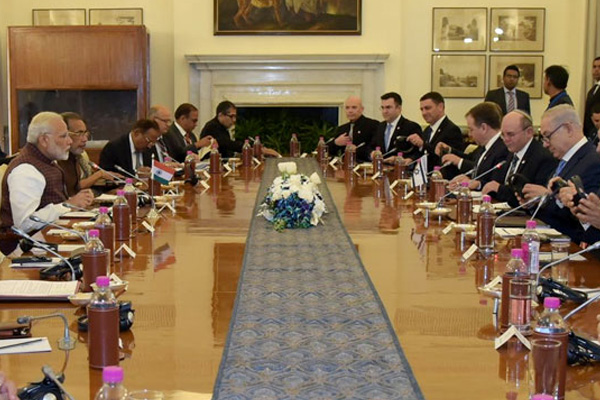
Mahindra group has also formed JVs with Israeli defence partners. Mahindra Aero Structures signed a MoU with Cyclone, a subsidiary of Elbit Systems, to collaborate on the production of aero structures parts and assemblies. Mahindra group’s Mahindra Telephonics has signed an agreement with Israel’s Shachaf Engineering. Both companies will jointly develop strategic electronics sub assemblies and systems for aerospace, marine and automotive applications.
India’s Dynamatic Technologies Ltd and Magal Security Systems of Israel have entered into an arrangement for India’s smart border management initiative. Both companies have rich experience in developing advanced technological solutions crucial for the protection of critical infrastructure and border management.
Kalyani Strategic Systems, a defence arm of Kalyani group, entered into a JV with Israeli government-owned Rafael Advanced Defence Systems. The Kalyani Rafael Advanced Systems Pvt Ltd has invested in the high-end technology and advanced manufacturing techniques to develop missile technology, command and control systems, guidance systems, electro-optics, remote weapon systems, precision guided munitions and more. Rafael has also signed an agreement with Hyderabad-based Astra Microwave Products Ltd to build tactical radio communication systems, electronic warfare systems and signal intelligence systems. India’s Punj Lloyd and Israel’s IWI (Israel Weapon Industries Ltd.) have set up the first private sector small arms manufacturing plant in Madhya Pradesh, to produce equipment for both local and export use.
India’s Small and Medium Enterprise (SME) sector’s contribution in Israel’s defence industry is significant too. Though relatively low in numbers, these SMEs support the bigger firms and are vital for enhancing Israel’s defence exports. A number of MSMEs (around 6,000) across the country act as suppliers to DPSUs (Defence Public Sector Undertakings, ordnance factories, Defence Research and Development Organisation (DRDO) and private industries, according to the Dhirendra Singh Committee report. This relationship is crucial for future security and prosperity of both the nations and maximising the military and commercial engagements should be the next goal of the India-Israel partnership.






